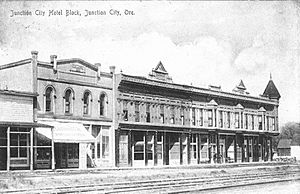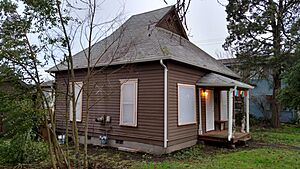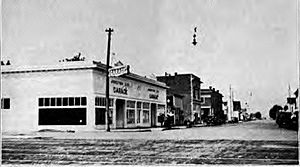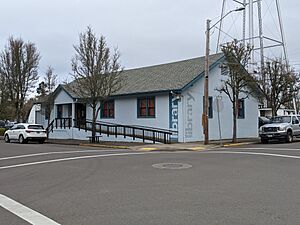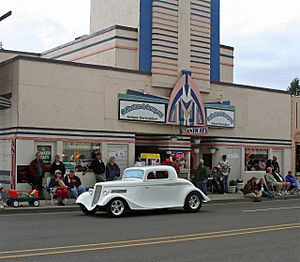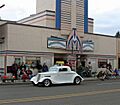Junction City, Oregon facts for kids
Quick facts for kids
Junction City, Oregon
|
|
|---|---|
|
City
|
|
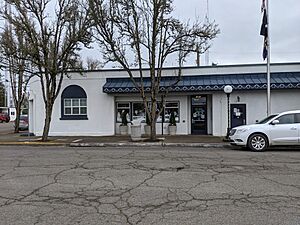
City Hall
|
|
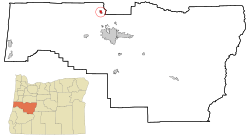
Location in Oregon
|
|
| Country | United States |
| State | Oregon |
| County | Lane |
| Incorporated | 1872 |
| Government | |
| • Type | Council-Manager |
| Area | |
| • Total | 3.30 sq mi (8.54 km2) |
| • Land | 3.30 sq mi (8.54 km2) |
| • Water | 0.00 sq mi (0.00 km2) |
| Elevation | 322 ft (98 m) |
| Population
(2020)
|
|
| • Total | 6,787 |
| • Density | 2,058.54/sq mi (794.77/km2) |
| Time zone | UTC−08:00 (Pacific) |
| • Summer (DST) | UTC−07:00 (Pacific) |
| ZIP Code |
97448
|
| Area code(s) | 541 |
| FIPS code | 41-38000 |
| GNIS feature ID | 2410157 |
| Website | www.junctioncityoregon.gov |
Junction City is a city in Lane County, Oregon, United States. It is known for its strong Scandinavian roots. The city's Scandinavian Festival draws over 100,000 visitors every year. In 2020, about 6,787 people lived there.
Contents
History of Junction City
Junction City became an official city in 1872. It got its name from a railroad leader named Ben Holladay. He thought this spot would be where two train lines would meet. However, one of the train lines was never built as planned. So, the train junction never happened.
Later, Junction City did become a meeting point for two branches of U.S. Route 99. These roads split in Portland and then came together again here.
In 1902, a real estate developer named A.C. Nielsen divided 1,600 acres of farmland. He advertised these small farms in a Danish-language newspaper in Iowa. Many families with Danish ancestry then moved to the area.
People in Junction City spoke Danish regularly until the 1940s. Church services were even offered in Danish until 1951. To celebrate this heritage, residents started the Scandinavian Festival in 1961. This yearly event is still very popular today. It honors the history of Danish and other Scandinavian immigrants in the area.
Community Issues in the 1990s
In the early 1990s, voters in Junction City faced some difficult decisions. There were two ballot initiatives proposed. These initiatives aimed to prevent the city government from protecting certain groups of people. They also wanted to stop public money from being used to "promote" certain lifestyles.
The first initiative passed by a very small number of votes in 1993. However, this election was later cancelled. This happened because there was proof of voter fraud. Some people who did not live in Junction City had registered to vote there.
A similar initiative was put to voters again in 1994 and passed by a larger margin. But in 1995, the Oregon Supreme Court made a decision. It ruled that all local laws like these in Oregon were not valid. This decision came after the Oregon Legislature passed a bill called House Bill 3500.
Geography and Climate
Junction City covers about 2.36 square miles (6.11 square kilometers) of land. There is no water area within the city limits.
Local Climate
The region has warm, dry summers. The average monthly temperatures do not go above 71.6°F (22°C). According to the Köppen Climate Classification system, Junction City has a warm-summer Mediterranean climate. This climate type is often called "Csb" on climate maps.
Population Information
| Historical population | |||
|---|---|---|---|
| Census | Pop. | %± | |
| 1880 | 428 | — | |
| 1900 | 506 | — | |
| 1910 | 759 | 50.0% | |
| 1920 | 687 | −9.5% | |
| 1930 | 922 | 34.2% | |
| 1940 | 1,187 | 28.7% | |
| 1950 | 1,475 | 24.3% | |
| 1960 | 1,614 | 9.4% | |
| 1970 | 2,373 | 47.0% | |
| 1980 | 3,320 | 39.9% | |
| 1990 | 3,670 | 10.5% | |
| 2000 | 5,132 | 39.8% | |
| 2010 | 5,392 | 5.1% | |
| 2020 | 6,787 | 25.9% | |
| U.S. Decennial Census | |||
2020 Census Data
In 2020, the city had 6,787 residents. This means there were about 2,058 people per square mile (794.7 per square kilometer). There were 2,704 homes, with most of them occupied.
Most of the people in Junction City were White (92.2%). Other groups included Black or African American (1.7%), Native American (5.2%), and Asian (2.4%). About 9.9% of the population was Hispanic or Latino.
Economy and Business
Junction City is located in the Willamette Valley, which has very rich farmland. The Willamette River is also nearby. This area is great for growing crops and raising animals.
Main Products and Industries
Some of the main farm products here are Hazelnuts, hay, and grass seed. People also grow nursery crops and Christmas trees. Sheep and dairy products are also important.
Junction City is also part of a growing wine region. The Lower Long Tom American Viticulture Area (AVA) was created in 2021. It is mostly located in the Junction City area.
Local Businesses
Several important farm businesses are in Junction City. Lochmead Farms is a dairy company based in the city. In 2018, their dark chocolate ice cream won first place at the World Dairy Expo. They also got second place for their vanilla ice cream. Lochmead Farms runs 44 Dari Mart convenience stores in the Willamette Valley.
The Eugene Livestock Auction is also in Junction City. It is the biggest livestock auction in western Oregon.
RV Manufacturing History
Junction City used to be a major center for making recreational vehicles (RVs) and motorcoaches. It was even called "The RV Manufacturing Capital of the World."
Country Coach, a big maker of luxury motorcoaches, was located here. It employed over 2,000 people. However, the company closed down in 2010 after facing financial problems. Other RV companies like Monaco Coach Corporation and Marathon Coach also used to be in Junction City. They later moved to nearby Coburg.
Guaranty RV Super Center in Junction City was once the largest RV dealership in the U.S. After the Great Recession, no RV or motorhome manufacturers remained in Junction City.
In 2015, the Oregon State Hospital opened a new campus in Junction City. This facility helps up to 174 people with severe mental health needs.
Arts and Culture
Annual Events and Festivals
- The Scandinavian Festival happens every year in mid-August. It features traditional Scandinavian costumes, crafts, and folk dance.
- The Daffodil Drive Festival is a two-day event in mid-March. It has a 6-mile (9.7 km) driving route. This route is filled with many daffodils and goes from Junction City to the Long Tom Grange Hall.
- The "Function 4 Junction" is a two-day classic car show and cruise. It takes place every June.
- The Highway 36 "52-Mile Yard Sale" is a three-day event in late June. Many yard sales are held along the 52-mile (84 km) length of Oregon Route 36. This road goes from Junction City to Mapleton. This event started in 2004. It is similar to the 127 Corridor Sale in Tennessee.
Education
The city is served by the Junction City School District. This district includes Junction City High School. Junction City is also part of the Lane Community College District.
Notable People from Junction City
- James A. Bushnell – First Chairman of the board of Bushnell University.
- Charity Dean – An expert in disease control.
- Bobby Doerr – A famous Major League Baseball player. He is in the National Baseball Hall of Fame and Museum.
- Kate Elliott – A writer of fantasy and science fiction books.
- Ty Harden – A Major League Soccer player.
- Eric Hays – A basketball player and coach.
- Buster B. Jones – An American guitar player known for his fingerpicking style.
- Derek Humphry – Founder of the Hemlock Society.
- Walter McClure – A track and field athlete.
- Dmae Roberts – A public radio producer, writer, and actress.
- Dave Wilcox – An American football player. He is in the Pro Football Hall of Fame.
- Justin Wilcox – An American football coach.
- John N. Williamson – A politician.
Images for kids
See also
 In Spanish: Junction City (Oregón) para niños
In Spanish: Junction City (Oregón) para niños
 | Ernest Everett Just |
 | Mary Jackson |
 | Emmett Chappelle |
 | Marie Maynard Daly |


